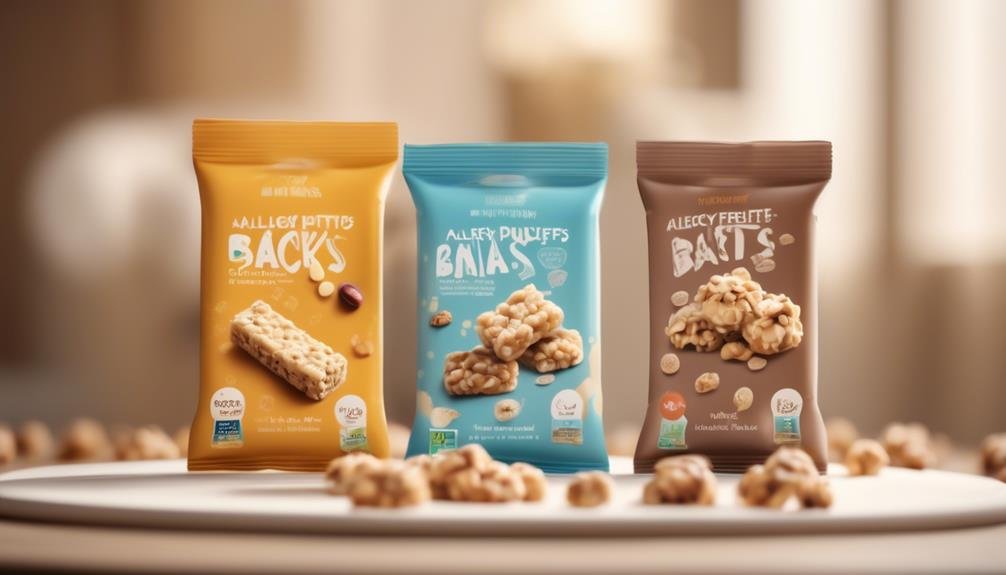"Cherishing Little Steps - A Haven for Baby and Family Journeys"
Allergy-Aware Baby Foods
When it comes to introducing solids to your baby, you want to ensure they are getting the best nutrition while also keeping their allergies in mind.
Allergy-aware baby foods offer a solution that allows you to navigate this delicate balance. But how do you know which brands to trust and what ingredients to look for?
In this discussion, we will explore the world of allergy-aware baby foods, from the common allergens to avoid, to the benefits they offer, and even some homemade recipes.
Join us as we uncover the secrets to nourishing your little one while keeping their allergies at bay.
Key Takeaways
- Food allergies affect 5-8% of infants.
- Delaying the introduction of allergenic foods doesn't prevent allergies.
- Allergy-aware baby foods are free from common allergens and ensure that your baby receives necessary nutrients without triggering allergic reactions.
- Choosing the right allergy-aware brands is important, including considering their history, clear labeling, third-party certifications, and recommendations from healthcare professionals.
Understanding Food Allergies in Babies

Understanding food allergies in babies is crucial for parents to ensure their little ones' health and well-being. Baby food allergies are becoming increasingly common, affecting around 5-8% of infants. It's essential to be aware of the signs and symptoms of food allergies in babies to facilitate early detection and prompt intervention.
The first step in understanding baby food allergies is recognizing the potential allergens. Common allergenic foods include cow's milk, eggs, peanuts, tree nuts, soy, wheat, fish, and shellfish. Introducing these foods to your baby's diet should be done with caution, starting with small amounts and closely monitoring for any adverse reactions. It's important to note that delaying the introduction of potentially allergenic foods doesn't prevent allergies; in fact, early introduction may actually reduce the risk of developing allergies.
Signs of food allergies in babies can vary but may include hives, swelling, vomiting, diarrhea, and difficulty breathing. If you suspect your baby may have a food allergy, consult a healthcare professional for further evaluation and guidance. Early detection of allergies is crucial to prevent severe allergic reactions and to manage your baby's diet effectively.
Common Allergens to Avoid
To ensure your baby's safety and well-being, it's important to be aware of the common allergens that should be avoided when introducing solid foods. Avoiding allergens can help prevent allergic reactions and keep your little one healthy.
Here are four common allergens to be cautious of:
- Cow's Milk: Cow's milk and products made from it, like cheese and yogurt, can cause allergic reactions in babies. Look for alternative options such as breast milk, formula, or plant-based milks like almond or soy milk.
- Eggs: Egg whites and yolks can trigger allergies in some babies. When introducing eggs, start with well-cooked yolks and observe your baby for any signs of allergic reactions, such as hives or difficulty breathing.
- Peanuts: Peanut allergies are common and can be severe. Avoid giving your baby peanuts or peanut products until they're older, as their immune system is still developing and more prone to allergic reactions.
- Wheat: Wheat is another allergen that can cause adverse reactions in babies. When introducing grains, opt for alternatives like rice, oats, or barley, and gradually introduce wheat products after consulting with your pediatrician.
Benefits of Allergy-Aware Baby Foods

Introducing allergy-aware baby foods can provide numerous benefits for your little one's health and well-being. By incorporating these specialized foods into your baby's diet, you can effectively manage food allergies and promote a healthier lifestyle.
Food allergy management is a crucial aspect of your child's health, and allergy-aware baby foods can make this process easier and more effective. These foods are specifically formulated to be free from common allergens such as dairy, eggs, peanuts, and wheat. They are carefully crafted to ensure that your baby receives all the necessary nutrients without the risk of triggering an allergic reaction.
Allergy testing for babies can be a daunting experience, but with allergy-aware baby foods, you can have peace of mind knowing that you are providing safe and nutritious meals for your little one. These foods have undergone rigorous testing and are certified to be allergen-free, reducing the risk of adverse reactions.
Here's a table to illustrate the benefits of allergy-aware baby foods:
| Benefits | Explanation |
|---|---|
| Convenient | Ready-to-eat meals and snacks make mealtime hassle-free |
| Nutritious | Packed with essential vitamins and minerals for optimal growth |
| Safe | Certified allergen-free, reducing the risk of allergic reactions |
| Variety | A wide range of flavors and textures to introduce your baby to different tastes |
Incorporating allergy-aware baby foods into your child's diet can help with food allergy management and ensure that they receive the nutrition they need while minimizing the risk of allergic reactions.
Choosing the Right Allergy-Aware Brands
When choosing the right allergy-aware brands for your baby, it's important to consider their reputation for safety and quality. Here are four key factors to consider when selecting safe brands and reading food labels:
- Look for brands with a history of producing allergen-free products: It's crucial to choose brands that have a proven track record of manufacturing baby foods that are free from common allergens such as peanuts, dairy, wheat, and soy. Research the brand's history and check for any recalls or safety concerns.
- Check for clear and transparent labeling: Look for brands that provide detailed information on their packaging. Ensure that the labels clearly state the absence of allergens and any potential cross-contamination risks. Additionally, make sure the labels are easy to read, with ingredients listed in a clear and understandable manner.
- Seek out third-party certifications: Look for brands that have obtained certifications from reputable organizations such as the Food Allergy Research & Education (FARE) or the Gluten-Free Certification Organization (GFCO). These certifications demonstrate a commitment to meeting strict standards for allergen control.
- Consult with healthcare professionals: Talk to your pediatrician or a registered dietitian who specializes in pediatric allergies. They can provide recommendations on safe brands and help you navigate through the confusing world of food labels, ensuring that you make the best choices for your baby's specific needs.
Nutritious Ingredients in Allergy-Aware Foods

Consider incorporating nutrient-rich ingredients into your baby's allergy-aware foods to support their growth and development. By choosing nutritious substitutes, you can ensure that your little one receives all the essential vitamins and minerals they need, while also avoiding potential allergens. Here are some allergy-friendly meal plan options that you can include in your baby's diet:
| Category | Nutritious Substitutes | Benefits |
|---|---|---|
| Proteins | Lentils, quinoa, tofu | Provides essential amino acids and promotes muscle development |
| Fruits | Berries, citrus fruits | Rich in antioxidants and vitamin C for a healthy immune system |
| Vegetables | Sweet potatoes, broccoli | Packed with vitamins, minerals, and dietary fiber for digestion |
| Grains | Brown rice, oats | High in fiber and provide sustained energy throughout the day |
| Dairy | Almond milk, coconut yogurt | Calcium-rich alternatives for healthy bones and teeth |
These nutrient-rich ingredients will not only provide the necessary nourishment for your baby's growth but also ensure that their meals are delicious and varied. Keep in mind that every baby is different, so it's important to consult with your pediatrician or a registered dietitian to develop a meal plan that suits your baby's specific needs. With these allergy-aware and nutritious ingredients, you can create a well-rounded diet that supports your baby's overall health and development.
Tips for Introducing Allergy-Aware Foods to Your Baby
To successfully introduce allergy-aware foods to your baby, follow these helpful tips:
- Start with homemade foods: Homemade baby foods allow you to have complete control over the ingredients, ensuring that your baby avoids potential allergens. By preparing meals at home, you can carefully choose allergen-free fruits, vegetables, and grains to introduce to your baby's diet. It also allows you to monitor the quality and freshness of the ingredients.
- Consider store-bought options: If homemade baby food isn't an option for you, there are now many allergy-aware baby food options available in stores. Look for trusted brands that clearly label their products as allergen-free. Read the ingredient lists carefully to ensure there are no potential allergens present.
- Allergy testing before introduction: Before introducing any new food to your baby, it's important to consult with a pediatrician or allergist. They can perform allergy tests to identify any potential allergies or sensitivities. This will help you make informed decisions about which foods to introduce and when.
- Gradually introduce new foods: Start by introducing one new food at a time, waiting a few days before introducing another. This will allow you to monitor your baby for any signs of allergic reactions. If your baby shows any adverse reactions such as rash, hives, or difficulty breathing, stop feeding them that particular food and consult a healthcare professional.
Allergy-Aware Snack Options for On-the-Go

If you're looking for convenient and allergy-aware snack options to take on-the-go, there are several options available for your baby. When it comes to allergy-friendly meal ideas, it's important to choose snacks that are safe and free from common allergens such as dairy, eggs, peanuts, tree nuts, wheat, and soy.
One great option is fresh fruits and vegetables. These aren't only nutritious but also easy to pack and carry. Cut up some apples, carrots, or cucumbers and put them in a small container. You can also add a side of hummus or a nut-free dip for added flavor.
Another option is rice cakes or crackers. Look for brands that are specifically labeled as allergy-safe, as some may contain hidden allergens. You can top them with avocado, dairy-free cheese, or even sunflower seed butter.
If you prefer something more filling, consider making allergy-friendly muffins or energy balls at home. These can be made with alternative flours like almond or oat flour and can be packed with fruits, seeds, or dairy-free chocolate chips.
Remember to always read labels carefully and check for any potential allergens. By being prepared and choosing allergy-safe snacks, you can ensure that your baby stays healthy and happy while on the go.
Homemade Allergy-Aware Baby Food Recipes
Make delicious and allergy-aware baby food at home with these simple recipes. Here are four homemade baby food recipes that aren't only baby-friendly but also allergen-free, perfect for allergy-friendly meal planning:
- Sweet Potato Mash:
Steam or bake sweet potatoes until they're soft. Then, mash them with a fork or blend them until smooth. Sweet potatoes are a great source of vitamins A and C, and they're gentle on a baby's stomach.
- Apple and Pear Puree:
Peel and core apples and pears, then chop them into small pieces. Steam or boil them until they're tender. Blend them together until smooth. Apples and pears provide natural sweetness and are high in fiber, promoting healthy digestion.
- Quinoa and Vegetable Blend:
Cook quinoa according to package instructions. Steam your baby's favorite vegetables, such as carrots, peas, and broccoli. Blend the cooked quinoa and vegetables together until smooth. Quinoa is a great source of protein and essential amino acids.
- Banana and Avocado Smoothie:
Mash a ripe banana and half an avocado together until creamy. Add breast milk or formula to achieve the desired consistency. Bananas and avocados are both nutrient-dense and provide healthy fats for a growing baby's brain development.
Transitioning to Regular Foods: Gradual Introduction and Monitoring

As you introduce regular foods to your baby, it's important to gradually introduce new foods while monitoring for any signs of allergies or intolerances. This process of gradual introduction allows you to identify any potential triggers and ensure your baby's safety. By taking the time to introduce one new food at a time, you can closely observe your baby's reactions and make note of any changes or symptoms that may indicate an allergy or intolerance.
To help you keep track of your baby's food introduction and monitor their reactions, here's a simple table you can use:
| Food | Introduction Date | Reactions/Symptoms |
|---|---|---|
Fill in each row with the name of the food, the date it was introduced, and any reactions or symptoms your baby experienced. This will allow you to easily identify patterns or potential triggers. Keep in mind that reactions can vary from mild to severe, so it's crucial to be vigilant and seek medical advice if needed.
Frequently Asked Questions
Can Babies Outgrow Their Food Allergies?
You can never be sure if babies will outgrow their food allergies. It's important to introduce new foods gradually and watch for any signs of an allergic reaction.
How Can I Tell if My Baby Is Having an Allergic Reaction to a Certain Food?
If your baby is having an allergic reaction to a certain food, there are signs to look out for. Common food allergens for babies include milk, eggs, peanuts, and wheat. Watch for symptoms like rashes, vomiting, or difficulty breathing.
Are There Any Long-Term Effects of Food Allergies in Babies?
Long-term implications of food allergies in babies can impact their growth like a tree stunted by a lack of nourishment. Allergies can hinder nutrient absorption and lead to nutritional deficiencies if not properly managed.
Can I Still Breastfeed if My Baby Has a Food Allergy?
You can still breastfeed if your baby has a food allergy. It's important to work with a healthcare professional to identify and eliminate allergens from your diet. When introducing solid foods, be cautious and follow their guidance.
Are There Any Medications Available to Treat Food Allergies in Babies?
There are medications available to treat food allergies in babies, but it's important to consult a healthcare professional before starting any treatment. Additionally, alternative treatments for baby food allergies may include avoiding allergenic foods and working with a pediatric allergist.
Conclusion
In conclusion, choosing allergy-aware baby foods can help protect your little one from potential allergens and ensure their health and well-being. Remember, 'an ounce of prevention is worth a pound of cure.'
By introducing these foods gradually and monitoring your baby's reactions, you can safely transition them to regular foods while minimizing the risk of allergies.
Trust in the nutritious ingredients and reputable brands available, and enjoy peace of mind as you nourish your baby's growing body.


